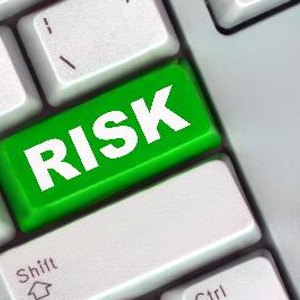
The larger a company grows, the more important risk management becomes in the daily running of the business. All companies face risk: Food service businesses risk serving spoiled food, transportation businesses risk delivering goods incorrectly and any company risks employee issues, which can result in lawsuits.
A risk manager comes in to, among other things, accurately assess risk levels and show a company how they can act proactively to reduce their legal liabilities, explains the International Risk Management Institute. Qualifications for work as a risk manager typically include a bachelor's degree, industrial certification and a specific skill set. Reviewing risk manager qualifications will help you decide if this career is right for you, or if you need one for your small business.
Risk Management Education Requirements
Generally, the minimum educational requirement for work in risk management is a bachelor's degree. The best fields of study for students pursuing a career in risk management include accounting, business management or finance.
For risk management within certain fields, such as healthcare or education, a bachelor's degree in management for that field, such as healthcare management or educational administration, can help you find work. Senior and executive risk management jobs typically require a master's degree in business management.
Tasks and Functions
In any given organization, a risk manager is responsible for identifying different business risks that the company takes on during everyday operations, then working to minimize these risks to reduce threats to the company.
For instance, if a risk manager determines that employees are under-insured, he may argue to company officials that more insurance should be purchased to reduce the company's legal liabilities.
At the company level, a risk manager must create and implement a risk management plan, which includes a process for handling risks in all business areas. Risk managers evaluate risk management plan results and organize the official reporting of risks throughout the company.
Required Skills for These Jobs
To be an effective risk manager, an individual must have knowledge of all areas of a given business, such as marketing, production or human resources, as well as how risks can arise in different situations, whether due to human error or outside forces. Risk managers must be effective communicators, and may have to communicate and implement a plan across a culturally diverse group of people.
Effective risk managers are also well-organized, have an acute eye for detail, have some level of mathematical expertise and are familiar with various risk management software tools that a company might use.
Certifications and Memberships
Professional certification by one or more risk management professional organizations is another way risk managers identify themselves as qualified for a specific position. One well-known risk management certification is the Financial Risk Manager, or FRM, professional designation awarded by the Global Association of Risk Professionals.
The Institute of Risk Management also offers different certification courses in risk management, which can be completed within five to nine months. Certification courses cover theory and practical applications of risk management; students are typically assessed through a final examination.
Read More: Companies That Pay for College
References

